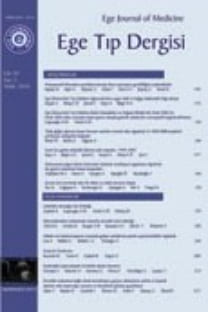Can different curriculum types affect opinions of tutors and students about problem based learning?
Farklı eğitim programları, eğitim yönlendiricileri ve öğrencilerin probleme dayalı öğrenim hakkındaki görüşlerini etkileyebilir mi?
___
- 1. Elliott M. Are we going in the right direction? A survey of the undergraduate medical education in Canada, Australia and the United Kingdom from a general practice perspective. Med Teach 1999;2:53-60.
- 2. Gurpinar E, Senol Y, Aktekin M. Evaluation of Problem Based Learning by Tutors and Students in a Medical Faculty of Turkey. KMJ 2009;41(2):123-27.
- 3. Davis MH, Harden RM. AMEE Medical Education Guide No.15: Problem-Based Learning: A practical guide. Med Teach 1999;21:130-40.
- 4. Barrows HS. A specific, problem-based, self-directed learning method designed to teach medical problem-solving skills, and enhance knowledge retention and recall. Tutorials In Problem-Based Learning 1984;16-32.
- 5. Bordage G, Zacks R. The structure of medical knowledge in the memories of medical students and general practitioners: categories and prototypes. Med Educ 1984;18:406-16.
- 6. Norman GR, Rosenthal 0, Brooks LR, Allen SW, Muzzin LJ. The development of expertise in dermatology. Arch Dermatol 1989;25:1063-8.
- 7. Papa FJ, Shores JH, Meyer S. Effects of pattern matching, pattern discrimination and experience in the development of diagnostic expertise. Acad Med 1990;65:21-22.
- 8. Cole CR. Differences between conventional and problem-based curricula in their students’ approaches to studying. Med Educ 1985;19(4): 308-309.
- 9. Newble DI, Clarke RM. The approaches to learning of students in a traditional and in an innovative problem-based medical school. Med Educ. 1986;20(4):267-273.
- 10. Dolmans D. Schmidt H. The advantages of problem-based curricula. Post Med J 1996;72:535-538.
- 11. Blumberg P. Michael J. The development of self-directed learning behaviors in a partially teacher-centred, problem-based learning curriculum. Teach Learn Med 1992;4:3–8.
- 12. Hill J, Rolfe IE, Pearson SA, Heathcote A. Do junior doctors feel they are prepared for hospital practice? A study of graduates from traditional and non-traditional medical schools. Med Educ 1998;32(1):19-24.
- 13. Moore GT, Block SD, Style CB, Mitchell R. The influence of the new pathway curriculum on Harvard medical students. Acad Med 1994;69(12): 983-939.
- 14. Dolmands D, Gijselaers W, Moust J, Grave W, Wolfhagen I, Vleuten C. Trends in research on the tutor in problem-based learning: conclusions and implications for educational practice and research. Med Teach 2002;24:173-180.
- 15. Norman GR, Schmidt HG. The psychological basis of problem-based learning: a review of the evidence. Acad Med 1992;67:557-565.
- 16. Azer SA. Challenges facing PBL tutors: 12 Tips for successful group facilitation. Med Teach 2005;27(8);676-681.
- 17. Dolmands DH, Ginns P. A short questionnaire to evaluate the effectiveness of tutors in PBL, validity and reliability. Med Teach 2005;27(6):534-538.
- 18. Kirkpatrick DL. Evaluating Training Programs. 2nd ed. San Francisco: Berret-Koehler Publishers Inc; 1998:657-661.
- 19. Vernon DT. Attitudes and opinions of faculty tutors about problem-based learning. Acad Med 1995;70(3):216-223.
- 20. Khoo HE, Chhem RK, Gwee MC, Balasubramaniam P. Introduction of problem-based learning in a traditional medical curriculum in Singapore--students' and tutors' perspectives. Ann Acad Med Sing 2001;30(4):371-374.
- 21. O’Neill PA, Morris J, Baxter CM. Evaluation of an Integrated curriculum using problem-based learning in a clinical environment: The Manchester Experience. Med Educ 2000; 34(3):222-230.
- 22. Hagi SK, Al-Shawwa LA. Evaluation of second and fourth year undergraduate medical students' perception and acceptance of the problem-based learning process. Saudi Med J 2011; 32(10): 1060-1065.
- 23. Usmani A, Sultan ST, Ali S, Fatima N, Babar S. Comparison of students and facilitators' perception of implementing problem based learning. J Pak Med Assoc. 2011; 61(4): 332-335.
- 24. Gurpinar E, Senol Y, Aktekin M. Evaluation of Problem Based Learning by Tutors and Students in a Medical Faculty of Turkey. KMJ 2009;41(2):123-127.
- 25. Gurpinar E, Alimoglu MK, Mamakli S, Aktekin M. Can learning style predict student satisfaction with different instruction methods and academic achiebvment in medical education? Adv Physiol Educ 2010;34(4):192-196.
- 26. Kaufman DM, Holmes DB. Tutoring in problem based learning: Perceptions of teachers and students. Med Educ 1996;30(5): 371-377.
- ISSN: 1016-9113
- Yayın Aralığı: 4
- Başlangıç: 1962
- Yayıncı: Ersin HACIOĞLU
Parkinson hastalarında antipsikotik kullanımı
L B. KIRAÇ, F. BADEMKIRAN, N. KARAPINAR, Z. ÇOLAKOĞLU
Sol ana koroner arterin total oklüzyonunda miyokard koruması ve cerrahi tedavi
E. OĞUZ, Ç ENGİN, F. AYIK, I. DURMAZ, B. EYGİ
Cemal KARA, İ. YAMAN, S. YÜREKLİ, A. UĞUZ
Warfarin kullanımına bağlı intestinal obstrüksiyon yapan intramural ince barsak hematomu
Kutis marmorata telenjiektatika konjenita tanılı olgu sunumu
B S. BİLGİN, M. YALAZ, N. KÜLTÜRSAY, METE AKISÜ
Hatay ilinde 2009 ve 2010 yıllarında bebek ölüm hızları ve nedenleri
T. ÇELİK, A B. ALTUN, B. KERKEZ, S. TATLI, C. ÖZER
R DURUSOY, G. MERMER, M. TÜRK SOYER
B. ATEŞ, F. SEYFETTİNOĞLU, Z. ATEŞ, F. DUYGUN, T. UCA
Üreterin primer sarkomatoid karsinomu
N. ŞEN TÜRK, A E. ZÜMRÜTBAŞ, C. ACAR, Z. AYBEK
İ G. AĞIRMAN, F. SÖNMEZ, N. SEMERCİ, F. Cengiz, N. ÇULHACIOĞLU
